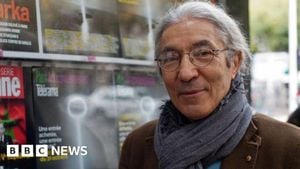On July 29, 2024, the small town of Southport was rocked by the tragic murders of three young girls at The Hart Space, where they were attending a Taylor Swift-themed dance class. Eighteen-year-old Axel Rudakubana entered the facility wielding a 20cm knife, inflicting life-threatening injuries on 26 children. Six-year-old Bebe King, seven-year-old Elsie Dot Stancombe, and nine-year-old Alice da Silva Aguiar tragically lost their lives, sending shockwaves throughout the community and beyond.
Rudakubana, previously known for his childhood acting roles, spiraled from being celebrated as a model pupil to becoming one of Britain's most notorious killers. His path to violence was marked by numerous warnings from teachers, police, and mental health professionals, who failed to prevent his destructive tendencies from culminating in such horror. His father, Alphonse Rudakubana, even intervened just days prior to the attack, stopping him from taking a taxi to his former school, where he reportedly planned another attack.
The signs were there for all to see. Rudakubana had previously admitted to bringing knives to school and sought help from Childline when he was bullied. He exposed growing violent tendencies, gradually becoming increasingly isolated with disturbing obsessions concerning violence, genocide, and infamous historical atrocities. His fascination with violence was underlined by his research on school shootings, his fixation on dictators, and his exploration of harmful materials found on his digital devices.
Authorities reported multiple interactions with Rudakubana, with police called to his home on several occasions due to concerning behavior, including attempts to harm himself and his family. Despite these warnings, he was not seized for his possession of knives or for making threats. Year after year, agencies struggled to connect the dots, missing numerous opportunities to intervene decisively.
The escalation reached its peak during the fateful summer day at The Hart Space, where Rudakubana systematically attacked children as they joyfully engaged in activities. Initially, he was captured on security footage entering the center, blending with the innocent atmosphere. Within seconds, chaos erupted as he unleashed violence on the unsuspecting children, claiming three young lives and traumatizing dozens more.
After the attack, investigators uncovered horrifying evidence of his planning. Searching his home, authorities found not only the knife used but also evidence of ricin production in his possession, showcasing his serious intent to harm not only those at the dance class but potentially others he had targeted. Documents detailing methods of assassination and extensive literature on genocide only punctuated the chilling mindset with which he approached his crimes.
Following his arrest, Rudakubana proclaimed, "I'm so glad those kids are dead, it makes me happy," underlining his lack of remorse, shocking the nation and sparking outrage and questions about how he was allowed to reach this point. Community leaders expressed their devastation, emphasizing how the hoisting of systemic failures contributed to this catastrophic event. "The tragic murder of Bebe King, Elsie Dot Stancombe, and Alice da Silva Aguiar has impacted our town and nation," stated leaders of The Community Church, highlighting the collective grief and mourning of the community.
Now sentenced to life with a minimum of 52 years, the focus remains on how Rudakubana’s history went unchecked by multiple agencies and how collaborative efforts can prevent such tragedies from happening again. The inquiry launched following his sentencing aims to troubleshoot these systemic failures and establish comprehensive recommendations for intervention in similar cases. The image of the quiet boy with potential turned murderer haunts the community and serves as a chilling reminder of the consequences when warning signs are ignored.
Reflecting on these events, many are left questioning: How many more missed opportunities could there be? How could a seemingly normal young man slip through the cracks so dangerously? It is the community's hope, one year on from the tragedy, to find answers to these questions and to seek reforms, so no parent has to face the unthinkable loss of their child again.



